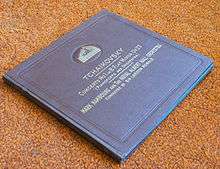
Myriam (Myriam album)
Myriam is the second studio album by Myriam. On her website it is also called "Myriam: Lo que Soy, lo que Pretendo y lo que Fui" (Myriam: What I Am, What I Pretend and What I Was) making reference to the lyrics of the album's first single "Hasta El Limite". It includes eleven songs with the collaboration of Tiziano Ferro, Leonel (ex Sin Bandera). Again Myriam co-wrote a theme along with Estrella. In this album Myriam brought a more fresh concept, almost 100% pop genre with a little touches of flamenco. It was released in July, 2004.
Album information
It was recorded in Argentina and the producer was Cachorro Lopez who had also worked with Julieta Venegas. Myriam's career was at a low point, as she was being criticized for her third place in Desafio de Estrellas, but all that was eclipsed by the success of this album. "Hasta el Limite" was the first single from the album; it was Myriam's first song with a promotional video, and stayed in the charts for more than 6 months. The second single was "Porque Soy Mujer" which was written by Myriam and her ex-classmate Estrella.

Myriam Montemayor Cruz
Myriam Montemayor Cruz (born February 8, 1981, Monterrey, Nuevo León, Mexico), better known as Myriam, is a Mexican recording artist, known for winning the first season of Mexican talent show La Academia.
Biography
Myriam grew up in a home with many brothers and sisters. Since she was a child, she dreamed of becoming a singer. Her musical career began in Monterrey with musical groups such as Obsesión, Conspiración, Ébano, Liberación and Compass.
In 2002, she was selected for the Mexican musical reality TV show La Academia. During this show she sang "Como la Flor", "Mudanzas", "De mi enamorate", "Él me mintió" and other songs. Her charm and personality, as well as her great interpretative talent, propelled her to become one of the most popular persons in the reality show. After 5 months on the show, she was announced the winner at the Season Finale in the Auditorio Nacional in Mexico City.
Myriam signed to EMI Music for 5 years or 5 albums. A week after winning La Academia, EMI released her first album, a compilation of the themes that Myriam sang in the show. It sold 300,000 copies within two months, topping the Mexican charts and being the first ex-student from La Academia to go double Platinum; at this time the album had sold more than half a million copies.
Miriam (disambiguation)
Miriam was the sister of Moses in the Bible.
Miriam or Myriam may also refer to:
People
- Mirriam, the English vocaloid from Zero-G, voiced by Miriam Stockley
In music
In science
Other uses

Myriam (Myriam Faris album)
Myriam is Myriam Faris's first studio album. It was released on October 21, 2003.
Track listing
Singles
Charts

! (album)
! is an album by The Dismemberment Plan. It was released on October 2, 1995, on DeSoto Records. The band's original drummer, Steve Cummings, played on this album but left shortly after its release.
Track listing
Personnel
The following people were involved in the making of !:
References

Album
Albums of recorded music were developed in the early 20th century, first as books of individual 78rpm records, then from 1948 as vinyl LP records played at 33 1⁄3 rpm. Vinyl LPs are still issued, though in the 21st century albums sales have mostly focused on compact disc (CD) and MP3 formats. The audio cassette was a format used in the late 1970s through to the 1990s alongside vinyl.
An album may be recorded in a recording studio (fixed or mobile), in a concert venue, at home, in the field, or a mix of places. Recording may take a few hours to several years to complete, usually in several takes with different parts recorded separately, and then brought or "mixed" together. Recordings that are done in one take without overdubbing are termed "live", even when done in a studio. Studios are built to absorb sound, eliminating reverberation, so as to assist in mixing different takes; other locations, such as concert venues and some "live rooms", allow for reverberation, which creates a "live" sound. The majority of studio recordings contain an abundance of editing, sound effects, voice adjustments, etc. With modern recording technology, musicians can be recorded in separate rooms or at separate times while listening to the other parts using headphones; with each part recorded as a separate track.
+ (disambiguation)
+ (the plus sign) is a binary operator that indicates addition, with 43 in ASCII.
+ may also refer to:
See also
Podcasts:

